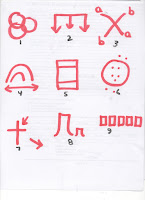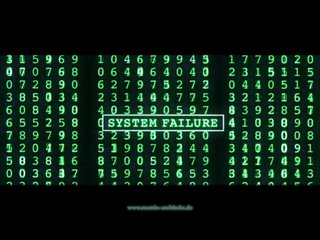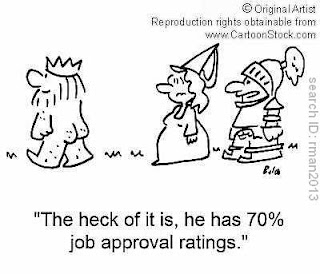Don't forget to bring a stack of magazines that you don't need...bring them tonight for our project next week..
---
Quiz tonight will look just like this.
The read symbols constitute the main quiz, which is not open notes. ---
Quiz tonight will look just like this.
The black symbols are the extra credit quiz, which IS open notes.
Mix and match..
More detail and where to find answers on main quiz, see Week 1 post, for detail /answers on extra credit quiz, see Week 3 Post.
a) Chiasm: Greek word for letter 'X.' A literary device that follows an 'X' or ABBA pattern or reversal; mirror image. Example: "the first shall be last, the last shall be first"
b). Subversion of Empire: The story of Jesus offers a counter-story to the dominant story/worldview of his day
c)The Three Worlds: Litereary (created by the text), Historical (behind the text). Conetmporary (in front of the text)
d).Intercalation (Sandwiching); a literary technique in which one story/narrative is inserted into the middle of another story/narrative. Example. The temple tantrum is inserted in the middle of the fig tree episode in Mark 11.
e). Intertextuality (Hyperlinking): cross-referencing, secripture quoting or referencing another scripture. Example: Jesus quotes Isaih 56: "My house will be a house of prayer for all nations."
f) Parallelism: a word, phrase, or idea is intentionally repeated throughout a text. Example: the five teaching blocks of Matthew.
g). Centered Set: Though it has a boundary, it is defined by direction of persons relative to the center (towards/ away)
h).Inclusio: a literary device inw hich a word, phrase, or idea is included at the beginning and ened ofa text (and sometimes in the middle). Example: the "with you"s of Matthew 1:23 , 18:20 and 28:20
i). Bounded set: Defined by boundaries, who is in or out
--------------------------------
 |
>>a)Fuzzy set: where the boundaries are not clear
>>b)Synonymous parallelism: says same thing different way.
Example, Luke 6:27-28:
"Love your enemies, do good to those who hate you
bless those who bless you, pray for those who abuse you"
>>c) Hubs:Just like on the internet, or any network, there are hubs/connectors/spokes in biblical connections/relationships
>>d)Anithetical parallelism: second line sets up contrast with first. Example: Matt 7:17-18 "Every good tree bears good fruit, but the bad tree bears bad fruit...
A good tree cannot bear bad fruit, nor can a bad tree bear good fruit."
>>e)Prophecy:"what God is saying in the moment, often about justice. Not justfore-telling (predicting the future) but forth-telling (telling forth truth). often having multiple applications and fulfillments, to different "contemporary worlds" and across time.
>>f)Kingdom of God: The rule and reign of Jesus; more Person and Presence than place; not just "then and there," but 'here and now" ...the "age to come" invades "this age">>g)step parallelism second line picks up thought/word from first and builds on it, takes it further.
Example, Luke 9:48:
"Whoever welcomes this child in my name welcomes me, and whoever welcomes me welcomes the one who sent me (and whoever welcomes the one who sent me...)
>>i)6 Degrees of separation: as in the "Kevin Bacon" analogy, science suggests everybody/everything is more interconnected than we realize.
--
SUPER RABBI
---
Hopefully, we;ll have some video posted on this very page of Rabbi Adam Bernay from his visit tonight, but for now, here is some info:
his congregation, his music, his radio show ...and FREE BOOK DOWNLOAD.
Rabbi Adam appears in the second video below. Both videos truly deal with our theme of community guidelines.
(especially this first one, one Matthew 18: 1-20,which we showed last week.) You'll see that these three staffers of our local Mennonite-Brethren related radio station needed me to run an intervention just so they could all get along:
Rabbi Adam will likely talk about 4 levels of Bible Study from a Jewish rabbinic perspective:
- 1)"pashat" "simple": plain, obvious, literal meaning
- 2)"remez" "hint" : implied, intuitive meaning
- 3)drash "search": Context is Everything, what comes before/after the passage
- 4)sod "hidden": secret, few find it
Questions:
- how does this dovetail, compare with the "Three Worlds" model?
- Does #4 worry you ? Does it sound gnostic? the rabbi seemed to be content that only a few experts can ever get to this level)
------------------
2)There are two rabbinic ways of reading a text:
- Hagakah: "path" commandments, prescriptive ethical/moral
- Hagadah: "narrative" not commandments, descriptive devotional/inspirational
- How does this relate to any devotional reading you do?
- Which of the two do you prefer?

video of Rabbi Adam visiting another class of mine/..explaining the prayer shawl.
-------------------------------------------------------------------------------------------------------------------
WEEK 5: WORSHIPPING IN COMMUNITY>>The Psalms were the basic ""literary world" worship and prayer book
for the "historical world" Jews....and the early Christian church..
..so why don't we follow it in our "contemporary world?" Maybe it's too honest.... and "spiritual."
There are several ways to categorize, organize and group the psalms.
You may have noticed they are broken into 5 "books." The 5 is probably intentional...for the same reason we found 5 teachings in Mathew: it's the number of Torah/Pentateuch/Moses.
There are different ways to categorize the "types" of psalms
Here is one way (thus the diagram):
- praise/thanksgiving
- petition
- lament
- imprecatory
These four categories sound pretty distinct, and they are...but sometimes they overlap and Venn in surprising ways. One psalm might visit most of these types, even switching midsentence.
How do they overlap, relate for you? I put them in a traditional order, but could they work in the opposite order (say, if you were having a bad day?). Where would you place them in the diagram?
How do they overlap, relate for you? I put them in a traditional order, but could they work in the opposite order (say, if you were having a bad day?). Where would you place them in the diagram?
--You may still be having trouble forgiving Walter Brueggemann for writing that book you had to read for last class (:..
But the same guy suggests another helpful way to categorize the Psalms:
q Orientation:
o Creation - in which we consider the world and our place in it
o Torah - in which we consider the importance of God's revealed will
o Wisdom - in which we consider the importance of living well
o Narrative - in which we consider our past and its influence on our present
o Psalms of Trust - in which we express our trust in God's care and goodness
q Disorientation:
o Lament - in which we/I express anger, frustration, confusion about God's (seeming?) absence
§ Communal
§ Individual
o Penitential - in which we/I express regret and sorrow over wrongs we have done
§ Communal
§ Individual
q Reorientation
o Thanksgiving - in which we thank God for what God has done for us/me
§ Communal
§ Individual
o Hymns of Praise - in which we praise God for who God is
o Zion Psalms - in which we praise God for our home
o Royal Psalms - in which we consider the role of political leadership
o Covenant Renewal - in which we renew our relationship with God
(Click here for more)We noted how astonishingly HONEST the prayer/worship book of the Jews (and Christians) is!
When we talk about the psalms of lament, psalms of imprecation, and psalms of disorientation being just as integral a part of biblical "worship" as the more "obvious," upbeat and "worshipful" psalms,
these comments from Bono of U2 comes to mind. He makes a good point:
Why are believers often so afraid of/threatened by the "honest and full truth," when the Scripture,
and the biblical "historical world," is not?
(By the way, Tim Neufeld teaches a whole FPU class on the Christian implications of U2;
you should also be aware of The Rev. Beth Maynard's blog)
Remember the video,"Everything is Spiritual"? (excerpt below)..
,,in a Hebrew/Jewish worldview, where everything is spiritual, it is not contradictory to be angry in one verse, and worshipful the next...as Kraybill says in your BIB 300 book, "The Upside Down Kingdom,"..
and how about this:
God in the Bathroom?The ancient Hebrew language didn’t have a world for “spirituality.” Apparently that category didn’t exist in ancient Hebrew thought because they believed that all of life had the potential to be “spiritual.” This is very different from our dualistic worldview that separates the world into two categories: the spiritual (sacred) and the material (secular). In this worldview, God inhabits the spiritual realm, but he leaves the material realm to us. In order for a dualist to experience God’s presence, he has to transcend the secular realm and tap into the sacred where he will find God. The Hebrew worldview rejects this dualism. Lawrence Kushner puts it this way:--
Judaism sees only one world, which is material and spiritual at the same time. The material world is always potentially spiritual. All things– including and especially, such apparently non-spiritual things and grossly material things as garbage, sweat, dirt, and bushes–are not impediments to but dimensions of spirituality.
That means it’s possible to encounter God’s presence anywhere, including the bathroom. Here’s a prayer taken from the Babylonian Talmud that was meant to be prayed while the pray-er was relieving himself:
"Blessed is he who has formed man in wisdom in wisdom and created in him many orifices and cavities. Is is fully know before the Throne of Thy glory that if one of them should be improperly opened or one of them closed it would be impossible for a man to stand before Thee."
If this prayer makes you uncomfortable because you think the bathroom is off limits to God, then you are a dualist.-by Wade Hodges
Here's a sermon I once did on Psalm 22, which is another amazing psalm to use in a worship setting...How often have you heard "My God, My God, Why have You forsaken me?" in a church song?.
But that sentence is not just what Jesus said on the cross, he was quoting (hyperlinking, intertexting) from the prayer book of the psalms.
One excerpt:
“I’ve got nothing left to give,” the professor said.
Several years ago some other pastors and I had responsibility for a pastors retreat. We decided to bring in a deep, profound, distinguished man of God; a professor renowned in the field of spiritual formation.
We were busy pastors, some of us bordering on burnout; we badly needed retreat…and training in the meat spiritual formation .
So there was indeed a huge hunger and holy hush in the room, when after weeks of waiting, the respected PhD, whom we were thrilled had said “yes” to flying out the 3,000 miles from his seminary to enlighten our relatively small but serious group, opened his mouth that first night.
Bibles and notebooks in hand , we leaned forward to receive what the master would say; what gleanings the guru had studied and prayed hard to impart.
His opening line broke the silence, the mood, and all the “rules” of grad-school-level spiritual formation 701:
“I have nothing to give.”
“Excuse me?,” I am sure we all collectively thought.
He continued, oblivious to our headscratching; indeed not even acknowledging the question marks hanging over us.
“I almost didn’t come. I almost cancelled, but I figured this retreat was booked, and I had better keep my commitment.
You see, the other day, I woke up to my wife saying ‘I’m leaving you.’
And she did.
I was so distraught that all I could do was immediately, and in a daze, drive the thousand miles to my best friend’s house.
When his wife answered the door, she could only manage: ‘How did you know?’
‘Know what?, I asked.
‘He just killed himself!’
I could only jump shellshocked into my car, drive all those miles back home..
..To find my house had been struck by lightning and burned to the ground.”
The question marks over our heads were gone.
He matter-of-factly concluded:
“So all I could do is keep my commitment and make this retreat where you want me to teach you spiritual formation. I’m sorry if I’ve made the wrong choice in coming; if I’m wasting your valuable time and money. I am here to teach spiritual formation, and maybe I can do that…
The only problem is I’m not sure I have anything left to give.”
That was the most profound lesson and lecture in spiritual formation that I have ever received.
As you can tell, I remember every word of that opening lecture.

whole sermon:
"The Lord Be With You...Even When He’s Not!"
---------------------------------
----
PHILEMON: If you have to miss tonight, be sure to get the notes from someone, as we did the two Philemon homework sheets in class, and anyone who did them got full credit.
Also, be sure to check the tabs marked "Philemon" and "three worlds" for tons of help on Philemon paper
------------------------------
-------------------------------------------------------



























